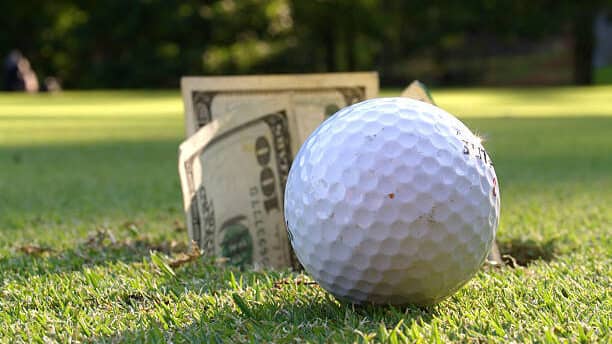Table of Contents
With the legalization of sports betting expanding across the U.S., new bettors are looking to get in on the action. One of the sports gaining popularity amongst bettors in the U.S. market is golf.
Golf provides a wide variety of betting options every week of the year. While popular North American sports like football, baseball and basketball have seasons that span only a few months, golf is played year-round. There isn’t a single week during any calendar year without a golf tournament somewhere in the world.
Let’s take a look at how to bet on golf. We’ll cover some basic terminology, explore the various golf betting markets and take a crash course in golf betting strategy.
How to Read Golf Odds
Before placing your bets, it’s essential to understand how to read golf odds.
Since golf tournaments feature upwards of 150 golfers competing each week, odds vary drastically between favorites and long shots. A pre-tournament betting favorite like Rory McIlroy will have odds in the +600 to +1200 range or 6/1 to 12/1.
A golfer ranked well outside the top 100 in the world may come with a price tag as high as 500/1, though those are usually reserved for the four major tournaments: the Masters, PGA Championship, U.S. Open, and Open Championship.
In the weekly PGA Tour events—think the Charles Schwab Challenge or the RBC Heritage—odds will usually end around the 300/1 range, depending on the strength of the field.
Odds expressed as +600, known as American odds, indicate how much a bettor would win on a $100 wager. If you bet $100 on Rory McIlroy to win at +600, you’d profit $600, while a $50 wager at +600 would net $300, and so on.
Sportsbooks may use fractional odds in betting markets, such as the 500/1 long shot above. This is straightforward, as you multiply your wager by the odds to calculate your payout.
How to Bet on Golf: Popular Markets
Tournament Winner
The most basic golf wager is the tournament winner. Place a bet on the player to lift the trophy and hope they stand in the winner’s circle.
Due to simplicity, this is the most popular type of golf bet. It’s straightforward, but the odds on certain golfers can be astronomical. You won’t get 500/1 odds on a Scottie Scheffler or a Collin Morikawa, but plenty of long shots win each year on the PGA Tour.
It’s common to see golfers with odds of 50/1 or higher enter the winner’s circle on Sunday.
Of all the major North American sports, golf provides bettors with the most playable long-shot value. The difference in skill between the No. 1 golfer in the world and the player ranked 50th is narrower than in any other sport. The No. 1 ranked UFC heavyweight fighter would destroy the fighter ranked 50th.
Since golfers compete against the golf course, the difference between the best in the world and dead last on tour is not much more than a few yards. Not to mention, anything can happen if a player gets hot with their putter.
Sports bettors who are serious about their craft use multiple sportsbooks to shop for the best line. This is particularly true for golf bettors, as the outright odds for a tournament winner will vary between sportsbooks.
You might see a golfer you like priced at 60/1 on DraftKings Sportsbook but find them available at 80/1 on FanDuel Sportsbook. For a $100 bettor, that’s a $2,000 difference in the payout.
By doing nothing more than placing your bet at a different sportsbook, you’ve increased your potential profit.
Finishing Position Markets
The next type of bet is the finishing position wager. These are bets on a golfer to finish inside the top 5, top 10 or top 20 of a given tournament.
While the odds aren’t as long as an outright winner bet, the likelihood of cashing is stronger.
If Tony Finau has odds of +2000 to win the tournament, his odds to finish top 5 would be about 1/5th the price tag, or +400. Top-10 tickets pay 1/10th, while top-20s pay about 1/20th of a golfer’s outright odds to win the event.
This is a recommended option if you are more risk-averse. It’s also a good option if you bet golf consistently, as it will help preserve your bankroll.
Within these markets, it’s important to note the relevance of dead-heat rules. Different books have different rules when it comes to dead-heat situations, but this occurs when a tie sees more players occupy the allotted number of finishing positions.
For example, let’s say you bet a player to finish in the top 10. He finished in a tie for eighth with four other players.
That would trigger a dead-heat situation as the player, in effect, finished in the top 12. Depending on the sportsbook, you would either see your odds or bet chopped by a proportional rate.
It is always better to bet at a book with an odds chop. Why? Because in that instance, you’ll still come out with a profit.
Some books, like BetMGM Sportsbook, offer finishing position markets that pay out all ties, though you’ll see a worse price. While it may seem a bad decision, avoiding dead heats altogether is oftentimes worth taking a slightly worse price.
Each-Way Betting
In golf, “each-way” betting refers to a bet that’s been split. Half of your wager is placed on a golfer to win the tournament, while the other half is placed on a top-5 ticket, for example. You can get exposure on a golfer you like without needing him or her to win the tournament.
For example, say Jordan Speith is available at 20/1 to win the tournament. You place a $100 each-way bet on Speith. In this wager, $50 is placed on Speith to win the tournament at 20/1, and $50 is placed on Speith to finish top 5 at 4/1.
If Speith wins the tournament, your wager will pay $1,200. You net $1,000 from Speith’s outright win ($50 x 20/1 = $1,000), and you’ll win another $200 because he finished top 5 ($50 x 4/1 = $200)
In this scenario, you’d have won more money if you bet $100 on Speith to win outright ($100 x 20/1 = $2,000) but wouldn’t get anything if he finished second through fifth. By placing an each-way bet, a third-place finish would still profit $150.
Deduct your outright wager from your top-5 winnings ($50 x 4/1 = $200) – ($50 Tournament Winner) = $150 profit.
While not all sportsbooks offer each-way bets, they’re pretty simple to recreate. Place two separate bets – one on an outright winner ticket and the other on a top-5 finish.
For longer outright picks, each-way picks often include an outright ticket and a top-10 selection, rather than a top five for the favorites. Should you choose to recreate with a golfer in the 50-75/1 range, half your wager should go on an outright with the other half on a top 10.
Head-to-Head Matchups
Sportsbooks create head-to-head matchups using golfers of comparable skill levels. Because golf doesn’t feature a point spread as you’d see in football or basketball, sportsbooks need to keep these matchups as even as possible.
Thus, you’ll never see a Rory McIlroy vs. Davis Love III matchup during a major, for instance.
Head-to-head matchups are offered in two categories. You can place bets on either full tournament matchups or single-round matchups.
Live Betting Golf
With so many options on mobile betting apps, one of the fastest-growing segments in sports betting is live betting – the ability to bet on a sporting event as it’s happening.
Live betting is prevalent in golf. Tournament odds will shift during a tournament as golfers progress through their rounds. You might catch a better number on a pre-tournament favorite if they start slow, or you might be able to ride someone who started better than expected.
Golf bettors can also live-bet how a golfer will score on any individual hole. Sportsbooks offer this market as a three-way bet: Birdie-or-bettor, Par and Bogey-or-worse.
Shrewd bettors can identify struggling golfers and bet them to make bogeys or back a golfer on a heater to make a run of birdies.
How to Bet On Golf: Prop Bets
Much like betting on the NFL Super Bowl, you can make many goofy side bets during a tournament. Prop bets are markets that don’t rely on the tournament’s winner. These are particularly popular during golf’s four majors.
Top Nationality
Bettors can take which golfer will be the top finisher from their respective countries.
While the U.S. is well represented on the PGA Tour, you’ll only see a handful of golfers from Ireland, Chile, Canada, etc. You can often find good betting value targeting golfers with longer odds in the less-represented countries on the PGA Tour.
Hole-in-One
What could be more exciting than watching a star player score a hole-in-one? Sportsbooks usually offer this as a Yes/No prop for most tournaments. Odds vary depending on the course layout, the number of entrants and other factors.
At larger tournaments, golf bettors can also place a wager on a specific player to make a hole-in-one, or the round in which a hole-in-one occurs.
Albatross
What’s more exciting than a hole-in-one? An albatross!
Sportsbooks offer markets on the rarest feat in golf, scoring a 2 on a Par 5. While extremely rare, cashing a ticket at close to +2000 odds is an exciting feeling for a golf fan.
Winning Score & Cut Line
Sportsbooks will set an Over/Under on the winning score of the tournament. Bettors can wager on whether the winning score will be higher or lower than the set line.
This bet is also available for the halfway cut line in a tournament.
These bets are primarily available during golf’s four major tournaments, when scoring is much more difficult to predict. Astute bettors can sniff out potential value on these markets, mainly when the weather makes playing conditions more difficult.
More Golf Prop Examples
- Top Senior Golfer
- Top Amateur Golfer
- Top Left-handed Golfer
- Top Golfer from Arizona State University
- How many balls will be hit into the water on 17?
- Will Bryson DeChambeau drive a ball more than 400 yards during the tournament?
Golf prop bets are nearly endless. Most are negative-expectation wagers, but you’ll catch a potentially profitable one every now and then.
Golf Betting Strategy
Pre-Tournament Research
Before blindly betting on your favorite golfer each week, some pre-tournament research is needed. You should only bet on sports you know best.
Unlike most major North American sports, where you can expect the best players to suit up for nearly every game, golf is different. It’s more common for top-ranked golfers to play fewer tournaments than average PGA Tour professionals.
Top players have earned exempt status, while lower-ranked players must accumulate points to retain their tour cards. As such, the world’s best golfers can afford to be selective with their schedule, while less-experienced players need to play more.
It’s a complex process the PGA Tour could tweak, but for now, don’t expect to see the game’s best tee it up at every tournament.
Since the list of golfers shifts between events, strength-of-field must be considered before making a bet. Betting Patrick Cantlay at 10/1 when he’s the top-ranked player in the field could be a positive-expectation wager.
Betting on him at 12/1 when McIlroy, Rahm, Scheffler, Zalatoris and Thomas are playing? The potential payout is larger, but it’s a worse bet.
Golf bettors must also consider the course layout. No two shots are ever the same, and there isn’t another sport on the planet with such variance. That’s why you need to plan your betting card accordingly.
On a longer course like Torrey Pines, you’d be wasting money betting on a golfer who doesn’t hit the ball very far.
Conversely, on a shorter, narrow course like Harbour Town, you’d want to target golfers who can hit fairways and greens. Forget the guys who attack courses with their driver, as their most significant advantage will be left in the bag for most of the round.
It can be argued that more research is required for betting on golf than any other sport. You need to know the course, plus the strengths and weaknesses of over 100 golfers.
Key Golf Betting Stats
Fortunately, there is plenty of underlying data on golfers that can help inform your wagers.
The stats section of the PGA Tour site offers countless statistics ranging from strokes-gained data to the leaders in top-10 finishes, all for free. Here, bettors can identify how players perform within individual measures that could impact their play at a given tournament.
The strokes-gained approach is arguably the most important factor for success. Quality iron shots often lead to birdie or better, so players who excel in this category often finish high on the leaderboard.
Depending on the tournament, bettors can target other statistics.
Take the AT&T Byron Nelson, for example. Here, the winning score is always amongst the lowest across the tour schedule, so bettors should add emphasis to birdies or better gained.
Conversely, at a more difficult setup like the U.S. Open, bettors can add extra weight to bogey avoidance as there will be fewer scoring opportunities.
Another useful tool for golf bettors is datagolf.com. Although some stats require a subscription, one of the most useful is their “Course Fit Tool,” which shows a bettor how a course compares to other setups in the U.S.
Bettors should be wary of players who consistently rely on their putter to shoot low scores. While players who drain long putts are exciting to watch, that usually means they’re losing strokes on approach.
These players may help cash a ticket over a small sample size. But as the sample size increases, consistently poor approach play will lead to poor results for these players.
Building a Card
It’s tempting to dedicate an entire wager to an outright winning ticket, but we recommend dividing your bet into several separate pieces.
Let’s use Rory McIlroy in the 2023 Masters as an example. McIlroy was priced at +1000 to put on the Green Jacket. Instead of putting a $100 wager on him to win the tournament, we would instead place five separate $20 bets as follows:
- McIlroy to Win: $20 at +1000
- McIlroy Top-5 Finish: $20 at +200
- McIlroy Top-10 Finish: $20 at -110
- McIlroy Head-to-Head: $20 at -110
- McIlroy Top Irish Player: $20 at -175
Using this method, we stand to win money if McIlroy wins the Masters, but we’ll also cash a few tickets if he stays in contention but doesn’t win.
McIlroy finished inside the top 10 in all four majors in 2022. He won none of them, netting bettors who backed him to win nothing.
If you had used the aforementioned strategy instead, you’d have made a small profit.
This approach is useful for any golf wager but needs to be adjusted if you bet someone further down the odds list.
Kevin Kisner to win the Masters was available at a whopping 150/1. Since his outright odds were so long, a betting strategy would be weighted differently and look something like this:
- Kisner to Win: $5 at 150/1
- Kisner Top-5 Finish: $10 at 30/1
- Kisner Top-10 Finish: $20 at 15/1
- Kisner Top-20 Finish: $40 at 6/1
- Kisner H2H Matchup: $20 at -110
Since winning a tournament as a 150/1 long shot is unlikely, it’s best to target these types of golfers in the secondary markets. If Kisner has a great week but only finishes eighth, our staggered betting card still earns a small return.
Winning Golf Betting Strategies
Before we finish, let’s share a few winning approaches that often lead to winning golf bets.
First, bettors should keep track of players who excel at a certain course. These players are often referred to as “horses for courses.”
Given that tournaments are usually played at the same tracks each year, bettors can target players who own a positive history at those courses. For example, Webb Simpson did so well at the Wyndham Championship each year (nine top-10 finishes in 13 starts) that he named one of his children Wyndham.
Other “horses for courses” include Tiger Woods at Augusta National Golf Club, Jon Rahm at Torrey Pines and Xander Schauffele at East Lake. Players can also have penchant for courses designed by the same architect, such as Patrick Cantlay on Pete Dye designs.
Another winning strategy concerns fading hot putters in round-to-round matchup markets.
As referenced earlier, players who lose strokes to the field on approach but gain with the putter can expect some negative statistical regression, with some encountering it more rapidly than others.
Thus, should bookmakers place a strong iron player in a round matchup with a player that relied on the putter to shoot their score, it’s often wise to take the former in that matchup.
It’s a fascinating time to be a golf fan. With the proliferation of legal sports betting, it’s an even better time to be a golf bettor. Please remember to enjoy golf betting responsibly.
The most basic tips include always betting within your means, not chasing losses and shopping for the best lines.
And above all else, stay patient. There’s always another golf tournament coming up soon.



